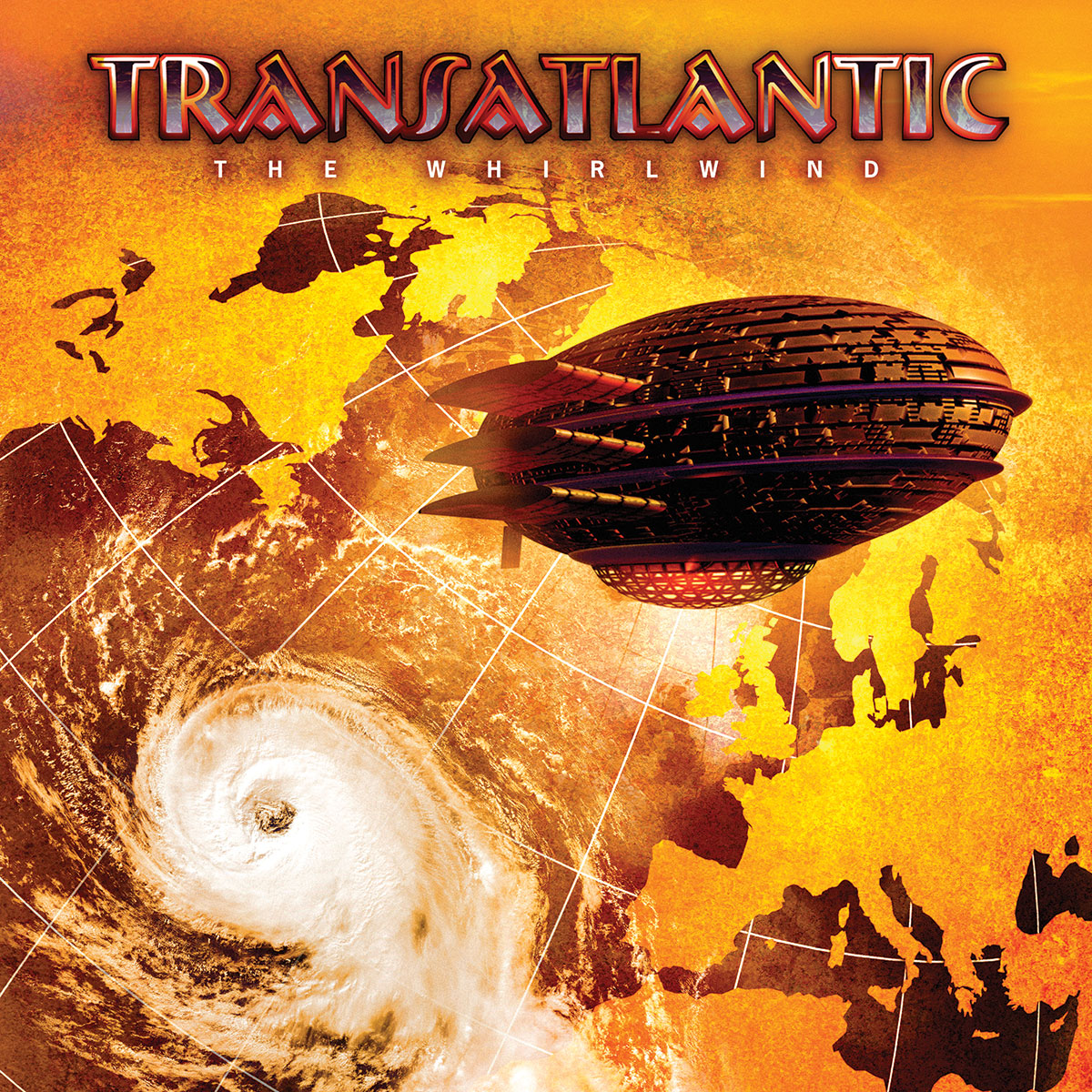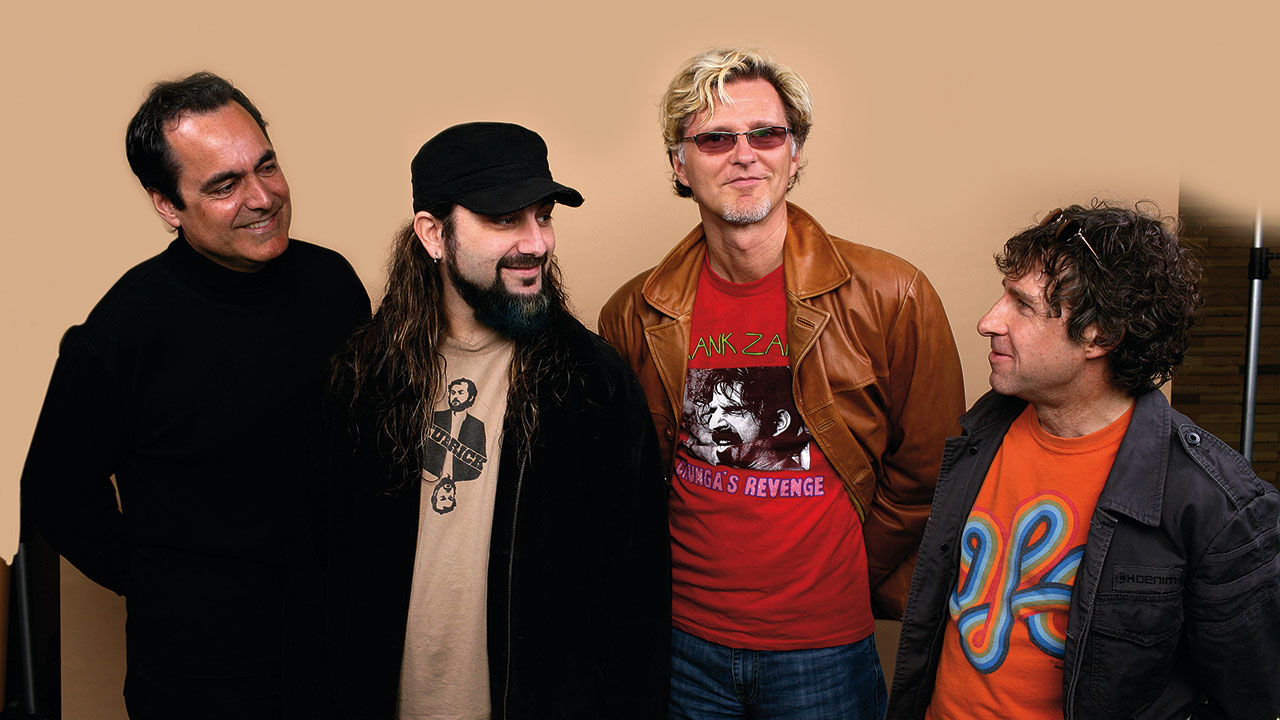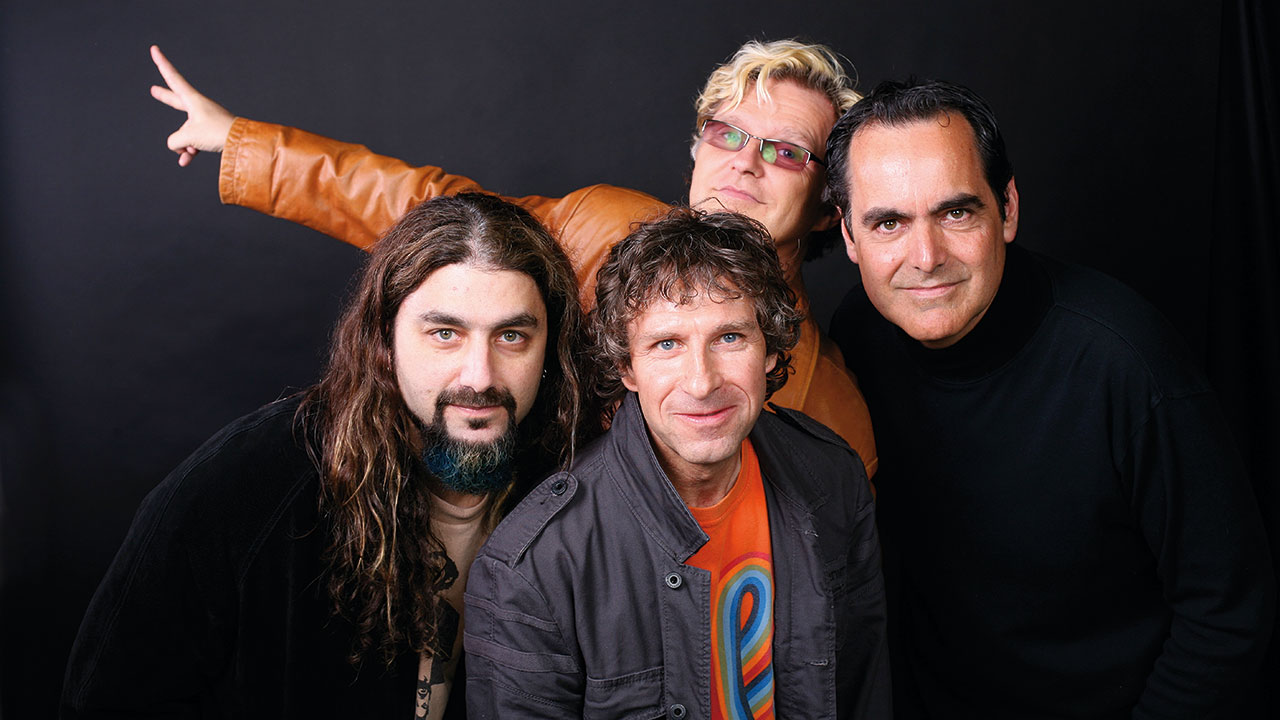In 2009 prog fans dreams came true when supergroup Transatlantic reunited and released their third album, the epic The Whirlwind. Prog sat down at the time with Neal Morse and Roine Stolt to get the scoop on their return.
Reclined on the sofa in his Nashville home, Neal Morse is in playful mood. “If Transatlantic were a pizza, Mike’d be the dough, Pete’s the sauce, I’d be the cheese and Roine would be the spice, all those unusual ingredients on top.”
A supergroup sure to whet any prog appetite, Transatlantic comprises former Spock’s Beard frontman Morse, Dream Theater drummer Mike Portnoy, guitarist Roine Stolt of The Flower Kings and Marillion bassist Pete Trewavas. The line-up originally formed in 2000 and with two warmly received albums and well-attended tours under their belt a promising future seemed in store. But just as this starry side-project began taking on a life of its own Morse – feeling the pull of a higher power – unexpectedly pulled the plug on the whole burgeoning enterprise. Transatlantic went into deep-freeze, and became something of a fabled, not-so-long-lost great band. It got to the point where it became an in-joke among The Flower Kings: the number one question among fans clamouring around Stolt after gigs wasn’t about that band, rather when the next Transatlantic thing was happening?
After the best part of a decade that reunion is happening right now, and Transatlantic are back with a fresh, generously laden slice of that progressive pizza. The Whirlwind is a rich, sweeping, long-form musical experience delivered by four virtuoso musicians with a libretto that – whether you embrace its religious overtones or not – runs the gamut from global Armageddon to spiritual salvation. It’s a continuous piece weighing in at a hefty 77 minutes, but fortunately perhaps for many listeners, one band member saw the value in splitting the opus into 12 smaller sections.
“Mike said he’d do it as one long piece of music on one condition,” laughs Morse. “He wanted to choose the track ID points. You see, I don’t really listen to music much on my iPod, but he listens almost exclusively to music on his. He puts it on random shuffle and he’s got really frustrated with where I put the ID points on my solo albums. So he took charge of tracking this one.”

Co-written by all four members, The Whirlwind is a concept album proper, with rock songs, ballads and long, elaborate jammed sections forming a cohesive whole. It’s a tour de force, which Morse has described as ‘inspired by universal lyrical themes, and brought to life through a journey of music that listens breathes and lives. It’s like an epic novel from Tolstoy, the War And Peace of prog’. Listening to it in the context of their other albums, it brings in spades the qualities that galvanised their popularity on 2000 debut SMPT:e and its 2001 follow-up, Bridge Across Forever. The Overture is a masterclass in arrangement and grandeur, but theirs is a mixed palette, mitigating complex instrumental passages with beautiful, traditional songcraft (the lilting Rose Colored Glasses), thunderous modern rock (Lay Down Your Life) and near-vaudeville whimsy (A Man Can Feel, complete with an eerie, Vincent Price-alike vocal from Stolt).
This almost never happened. When Morse ditched the band - and his regular gig with Spock’s Beard too - in order to create music that promulgated his strengthening Christian faith, fans and fellow members alike believed that to be the end of the Transatlantic story. But two years ago the keyboardist began to have a change of heart.
“A couple of things happened,” he says. “I was having dinner with a friend who’s not a big fan of progressive rock, and for some reason he blurted out that I should do another prog epic with Transatlantic. It was strange, and it did get me thinking. Then I wrote a demo called The Whirlwind, and it sounded ‘Transatlantic-y’ to me. I prayed and began thinking that maybe it was God’s will that this was the right direction to go.”
Throughout our conversation, when Morse speaks of his religious conviction he is always trenchant, but never sanctimonious, and Transatlantic’s latest achievements can be appreciated whether the listener shares his beliefs or not. In fact, in giving his down-to-earth account of things Swedish guitarist Roine Stolt emerges as an amicable, secular foil for Morse. While they make a wonderful racket together, these four guys are clearly very different.
“Neal sent out the …Whirlwind demo,” Stolt remembers, “and he asked if we were interested in doing another Transatlantic album. The rest of us had been waiting for this to happen. As time had gone by I thought it wasn’t going to, so it was kind of a surprise and we all said yes immediately.”
Demos were exchanged, and then came the considerable logistical issue of getting the four busy musicians in the studio. Whilst Morse and Stolt were available, Portnoy and Trewavas both had touring commitments to Dream Theater and Marillion, but eventually a slot became clear. The band converged on Morse’s Nashville home studio in April.
“We thought the best thing to do was get together in the studio and see what happened,” says Morse. “Some of the guys had flown considerable distances so I thought they’d need some rest, but we started work the very first night and got the whole album sketched out, all the major themes were in the works. It only took us four days to write it. We work really fast when the inspiration’s there, and we took certain parts straight from the demos we’d sent each other over the previous few months.”
“That was very quick for me,” laughs Stolt. “People ask what it’s like recording with the band, well you get into a room and the bits just seem to fall into place, like a miracle. We’re never short of ideas, which is the main thing. Mike is sometimes seen as a drummer boy, but in fact he’s an intellectual. He conducts the band. There are lots of great drummers out there but there aren’t many like him who can look at the songs and the different pieces and arrange these ideas into a cohesive whole.”
Morse agrees. “Mike’s a take-charge guy. He’s very good at picking the best parts of other people’s demos and figuring out how to arrange it, like a really good producer would. And then, of course, his drumming is unbelievable.”

Though the CD sleeve credits the songwriting to Transatlantic collectively, Morse has been disheartened by the tendency of early reviewers to attribute much of that work to him. “People would be surprised by how much is written by Pete. The main theme in the Overture is his, and the very first vocal is Pete’s melody, sung by Roine. Pete threw out a lot of the chord changes on [the Roger Waters-style doomathon] Is It Really Happening?, and his bass playing’s amazing too, nice and loud in the mix. As for Roine, he’s so creative. He came in with A Man Can Feel and we played that just as it was on his demo.
“Transatlantic is a collaboration, and I think that’s what makes it different, otherwise it’d sound like a bunch of guys playing my or Roine or Pete’s music. Most of the time it’s exhilarating, with tons of ideas going round. Once in a while it’s challenging: if the whole band’s pulling in one direction and you don’t agree, you don’t have any choice. That happened a few times, but the good things far outweigh those moments.”
This is a new slant on their new chapter. As Stolt admits, their first two albums did seem stamped with Neal Morse’s signature songcraft. “Looking back at the SMPT:e, Neal had a lot of influence as he was the lead singer and writer. He’s a prolific guy, and when you’ve got him and Mike in the room, stuff is going to happen. I’m more the one who sits back, looks at what’s happening and then maybe the next day I’ll say, hey how about doing this there or that there. But coming from The Flower Kings where I’m the main man it was nice to take a back seat. I had a few bits and pieces in there, and on the second one Pete and I had more of an impact. But on The Whirlwind it was very much like a real band. A band is always a compromise, but everyone felt they had a chance to get their voice heard. We’d all grown a bit; we were all more ready to give and take and not push our own ideas too much. We were really listening to each other, and that comes out in the music.”
Before April’s recording sessions, the last time the full band performed together was during their sole European tour in 2001. Morse became a born-again Christian in 2002, and couldn’t square his new-found faith with what he was doing with both Transatlantic and Spock’s Beard. He left both bands and over the rest of the decade focused mainly on albums of Christian worship, from 2003’s Testimony to last year’s Lifeline.
“The reason I left is really hard to explain,” says Morse. “I just felt like God was asking me to. When I would pray and have quiet moments alone with the Lord I’d feel this small voice telling me, it’s time, you know what you need to do. It wasn’t that I wanted to; I didn’t know what I was going to do. I was just following the Lord’s guidance as best as I could.”
It would be disingenuous to imply that Morse’s refusal to perform with the band eight years ago led to a rift between players. After all, Transatlantic was only ever a side-project, they each had a ‘day job’ in some of modern prog’s most notable groups. But if fans were bewildered as to Morse’s motives, so were some of his bandmates.
“At the time I was puzzled,” recalls Stolt. “It just came out of the blue. To this day I’ve never understood why we couldn’t keep making music with Transatlantic. Neal had been working really hard to push sales and get more people to the concerts, and once people were raving about us and coming to the concerts he just said, I’d like to stop now.
“I very much respect it though, and if it isn’t right you shouldn’t be in a band, but I never saw anything evil in the music we were making. It’s not like we’re a satanic, black metal band! But I’ve never wanted to put him against the wall and ask him why. We never spoke about it and we haven’t mentioned it since. It was his decision to make.”
Morse’s recent volte-face may have been initiated by his non-prog fan friend and the demo that became The Whirlwind’s Overture, but there was also a nudge from that same higher power. “I felt like it was time for Transatlantic again, that’s what was wanted. God was putting people and things in my path to point me in this direction. I wouldn’t have done it otherwise.”
It’s hard to extricate Morse’s faith from The Whirlwind’s lyrical themes of apocalypse, exodus, sacrifice and – in the rapturous closer Dancing With Eternal Glory – redemption. “The concept of The Whirlwind is you’re in a confused state,” he says. “It could apply to your own personal life or to things happening in the world. The idea is God will sometimes put us in a state of confusion for his purposes, and for reasons we don’t understand. It’s only when we step back later we can see how He used it. Sometimes we have to get a little off our own ground before we’ll seek Him. But we approached the concept in a very abstract way, there are many facets of it on the album. But the fact that my lyrics and Pete and Roine’s ideas fit with the …Whirlwind concept was what I would call ‘providential’.”
Roine Stolt – ever the agnostic foil – counters: “Some of the lyrics I’d had lying around for a year, but they coincidentally fit with the concept. But that’s the good thing about art, you can do whatever you want and if you do it with conviction it makes sense. ‘I love you baby’ rock lyrics can only be seen one way, but with, say Genesis’s Supper’s Ready, or some of the things John Lennon wrote when he was on LSD, they can be about anything. It triggers your imagination, it’s interesting stuff and it probably means different things for different people. People can listen to The Whirlwind and it’s open to interpretation, and that’s part of the excitement.”
With tentative plans afoot for a …Whirlwind tour of Europe, the US and beyond in 2010, Roine Stolt thinks he knows what’s kept Transatlantic in the prog audience’s mind during their absence. “It’s probably the joy of seeing four guys from four popular bands play together. Dream Theater is more metal, Marillion is more song-based, Spock’s and Flower Kings are more similar maybe. We’re not alike – we don’t really talk about anything other than the music – so when we get together we’re filling in each other’s blanks. There’s no denying there’s a very special energy.

